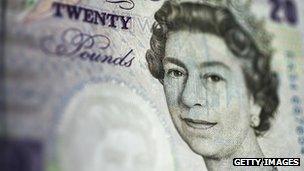Mobile money misery
- Published
- comments

Could we live in a cashless society?
Wouldn't it be great if you could leave your wallet at home and pay for everything with your mobile phone? Well, OK, not everybody is in love with the idea of the cashless society, but the march of mobile money seems unstoppable right now. Or does it? As an enthusiast early adopter of anything which might make life simpler, I've been trying out these new ways of paying - and I'm on the verge of chucking it in.
My frustration came to a head after I was sent £1 last week by someone using the Barclays Pingit system. Actually not just someone, but the man I consider the guru of digital money, Dave Birch, a consultant who writes about the subject and advises many of the leading players.
A few weeks earlier I'd been trying out O2's new mobile wallet, and after negotiating my way through about a dozen passwords, pet's names, best friend at school and other security paraphernalia I'd finally managed to send £1 via text message to Dave. He was now returning the favour (without interest, I may add - that's consultants for you).
Having registered once for Barclays Pingit - and then not used it - I assumed it would be easy to retrieve my £1 from Mr Birch. Not so. First I had to register my own bank account to the Pingit account to receive payments. That involved another string of passwords - and a verification code. Which would arrive from Barclays in the form of a letter to my home - how very 21st Century!
A week later, the letter arrived, and last night I excitedly punched the code into the Pingit app and waited. After about thirty seconds, the app crashed and refused to reopen, while I contemplated smashing the phone against the wall. Eventually, I did manage to get it going again and found that the £1 had made its way into my account. Exultant, I decided to send my wife £5 via the Pingit app. She is now looking daggers at me over the breakfast table and wondering why I can't simply hand her a fiver.
And here's the problem with mobile money right now. There are plenty of ways of using your phone to pay - from Pingit, to O2's mobile wallet, to the PayPal app or NFC phones where you simply swipe to pay. But right now the aggravation factor still outweighs the potential benefits.
In the developing world, it's a different story. Some recent figures showed that in Kenya, for instance, 96% of mobile phone owners use a mobile payments system - mainly MPESA which helps users transfer cash via text message. In countries where many don't have bank accounts, any complexities in using mobile money fade into insignificance besides the sheer usefulness of the service.
Here, though, the mobile money evangelists are struggling to convince consumers that their lives will be made simpler and better once they can pay by phone.
Still, I'm not easily put off. I've now got four different mobile money applications on my phone, and I'm going to see how far I can get without cash. I will report back in a week or so...